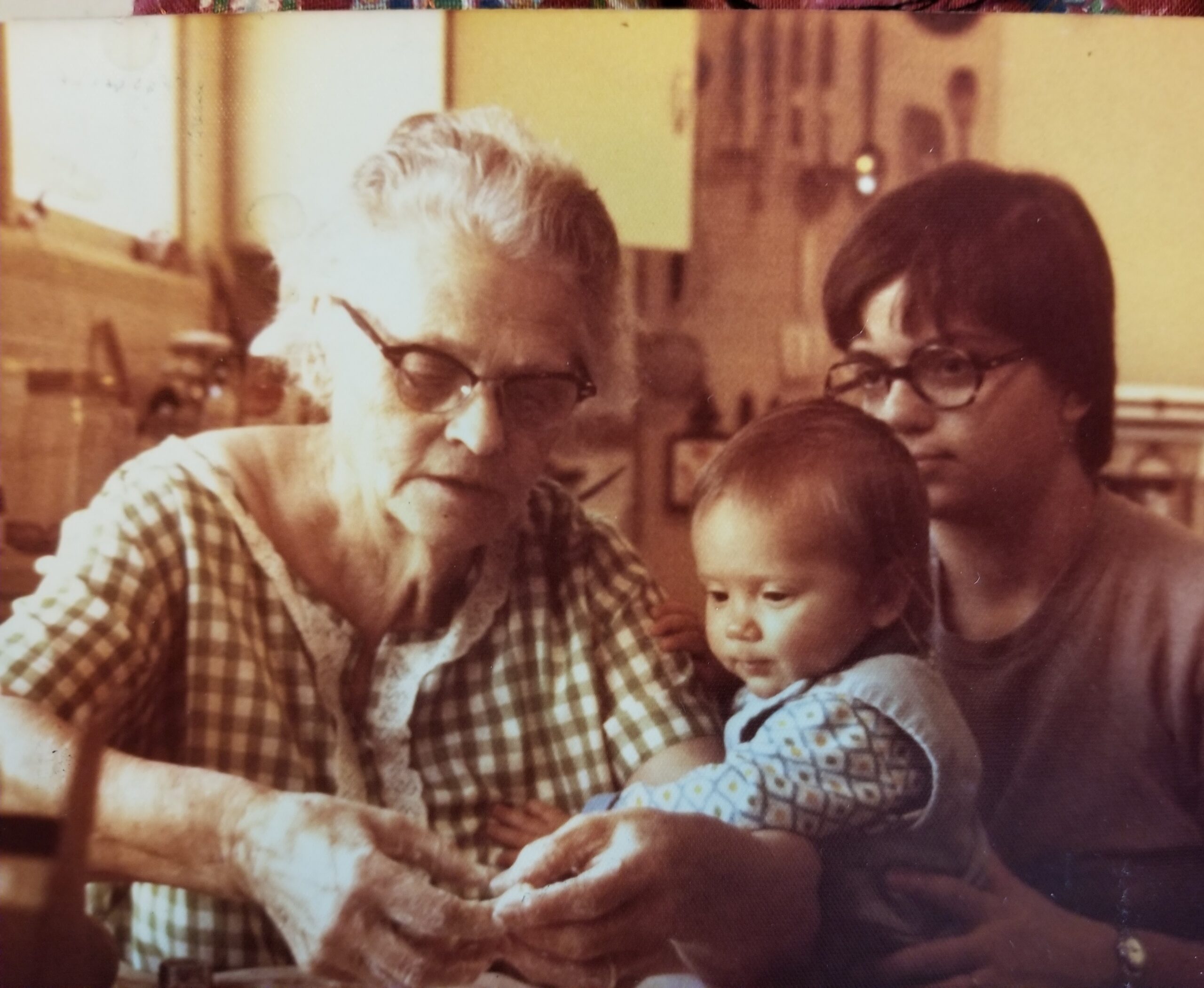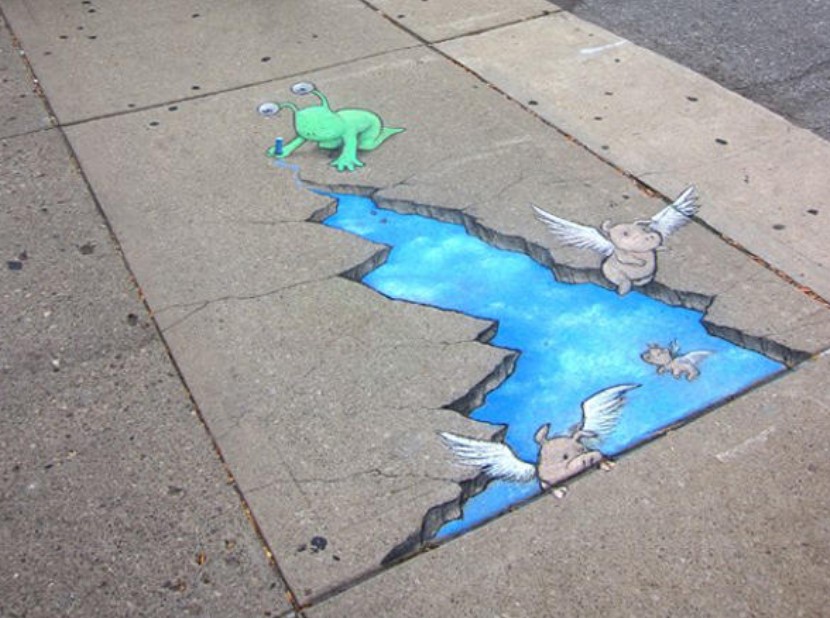
My grandmother (Nana) making noodles with my sister and my niece, circa 1974.
Write about a special person in your life. The person can be alive or no longer living. It could also be an animal.
#justwrite #iamawriter #amwriting

My grandmother (Nana) making noodles with my sister and my niece, circa 1974.
Write about a special person in your life. The person can be alive or no longer living. It could also be an animal.
#justwrite #iamawriter #amwriting

Guest Blogger Sharon Ziff writes:
I lost my gloves—the ones I bought in Venice last year. I loved them. LOVED THEM. How could I love a pair of gloves? They had a soft, fluffy pompom on the top. I liked to stroke them. It was like petting a kitty. Sadness. And upset with myself for losing them.
So I lost a pair of gloves. How could I feel this deep emotion for a pair of gloves? It’s the attachment to my experience in Venice and my love for the friend I was with.
Loss is a recurring theme in my writing. At times, I struggle to manage the intense feelings that accompany loss. There’s a burning sensation in my belly that I want to go away. I find myself thinking, “No, no, no,” while tears begin to flow. It’s not about the lost gloves; it’s about the impermanence of life.
To cope, I have established a gratitude practice, focusing on appreciating the little things. Friendships are crucial in supporting me through my feelings and creating a safe place for expression. I have friends with whom I can laugh after the tears have flown.
Meditation and journaling help me process my emotions and provide a calming effect. I also have a favorite playlist that serves as a therapeutic outlet, allowing me to reflect and connect with positive memories.
Change and loss are a part of life. Aging brings about losses with a decline in health. You may slow down and cannot do everything you did when you were younger. Retirement brought changes. You are adjusting to a new routine or lifestyle you may not have anticipated. Give yourself time. What are some of your passions that can still provide you with a fulfilling life? Focus on them.
We can be prepared for change and build resiliency as we age. Prepare for the practice of accepting what is.
As Frank Ostaseski writes in “Five Invitations,” Welcome everything, push away nothing. It doesn’t mean you have to like it. Then focus on what you can do.
Embrace the joys. As the song goes, “Accentuate the positive, eliminate the negative, and don’t mess with mister in between!”
Sharon Ziff, RN, spent twelve years as a Hospice Nurse where she learned about end-of-life issues and the importance of the preparations to die with dignity.
Sharon is certified in the “Authentic Presence: Contemplative End of Life Care Training,” a specialized program, and is committed to providing the Community Education Project called “Let’s Speak About Death.”
Links to The Write Spot Blog posts about loss:
“The Write Spot: Writing as a Path to Healing” contains lists of valuable resources, including the restorative power of putting uncomfortable memories to paper.
Memorable writing that sparks imagination. Lean in. Hear the writer’s voice on the page.
A Brick Path
By Douglas Newcomb
I often tell the children that they must be afraid before they can be brave.
Courage doesn’t travel alone, aimlessly,
And doesn’t just drift anywhere it pleases.
It follows fear and despair
Quietly.
I had courage enough to roar once,
but was interrupted,
and forgot what it was I was there to say.
Now I don’t remember how I got here, or which direction I was headed.
Out here the road stretches left and right as if arms unfolding.
Douglas Newcomb lives in Petaluma, California, and grew up in the Sierra Nevada foothills.

It’s Halloween week.
Does this mean anything special to you? Or, ho-hum, just another day/evening?
Did you go trick-or-treating as a child? With siblings, cousins, friends?
If yes, where did you go?
What was that like?
Describe your favorite and least favorite Halloween costume that you wore.
What clever or interesting Halloween costumes have you seen? Where did you see this?
Is Halloween week a fun time for you? Or is it a trickster, something you really don’t like?
If you worked with children/students, what was / is Nov. 1 like?
#justwrite #iamwriting #iamawriter

Did you wear a uniform for work or school?
If yes, describe the uniform.
What were your duties while wearing this uniform?
Worst part of the duties and uniform?
Best part of the duties and uniform?
OR:
What is your reaction when you see somebody in uniform?
Marching band, sports uniform, law enforcement, firefighter, doctor (white lab coat or scrubs), prison inmate, postal workers, FedEx and UPS employees, private security guard, housekeeping staff, life guard, food delivery person, etc.

How to make your writing memorable.
Step 1. Choose something you have written.
Step 2. Circle all to-be verbs.
Step 3. Replace “to be” verbs with strong verbs.
Step 4. Rewrite, using the idea of “show, don’t tell.”
Links to blog posts about strong and memorable writing:
Why Should You Use Strong Verbs?
Sparks, memorable writing on The Write Spot Blog

In “The Wizard of Oz,” the tinman wants a heart, the scarecrow a brain, the lion wants courage. And, of course, Dorothy wants to go home.
Auntie Em, Uncle Henry, and Professor Marvel also want Dorothy to return safely home.
Their neighbor Almira Gulch wants to capture Dorothy’s dog, Toto.
Is the Wizard of Oz a charlatan, like Professor Marvel? Or is he a bumbling, absent-minded imposter?
And, of course, Dorothy must overcome obstacles before she can return home.
And then there is the wicked witch, the Munchkins, the monkeys, the hired hands, and of course, Glinda, the good witch, or is she a witch?
Which Oz character do you identify with?
What do you want? In general, what do you want?
Is there a place or time you want to return to?

October is breast cancer awareness month.
I would like to expand to body awareness.
Write about an illness or a physical change you, or someone you know, went through.
Include your age and who was involved.
How did you find out about the illness?
What was the next step?
What happened?
Are you still affected by this illness/physical change?
#justwrite #amwriting #iamawriter

Photo by David Zinn
Prompt: A fish out of water story.
Write about a time you felt like a fish out of water, where you didn’t fit in, or you wondered if you belonged.
Inspired by Sept/Oct 2024 Writer’s Digest, “Level Up Your Writing Life,” by Sharon Short.
#justwrite #amwriting #iamawriter

According to Diane Stark, author of “Life of the Party,” a Chicken Soup story in “Be You:”
“If your favorite activity is a busy one that involves lots of people, you are an extrovert. If your activity is a quiet, solitary pursuit, you are an introvert. The vast majority of writers are introverts. It’s just how we’re wired.”
Diane discovered, “I am a social introvert. It’s someone who is outgoing, but also requires alone time to be healthy.”
Prompt: Are you an introvert, an extrovert, or a combination?
List your three favorite activities.
Are these things you do by yourself or in a small group, or with a lot of other people?
When you are tired or stressed, what activity appeals to you most?
After being by yourself all day, are you anxious to be around other people?
Or, do you need downtime to recover?
What energizes you?
What restores your equilibrium?
Just Write!
#amwriting #iamawriter #justwrite